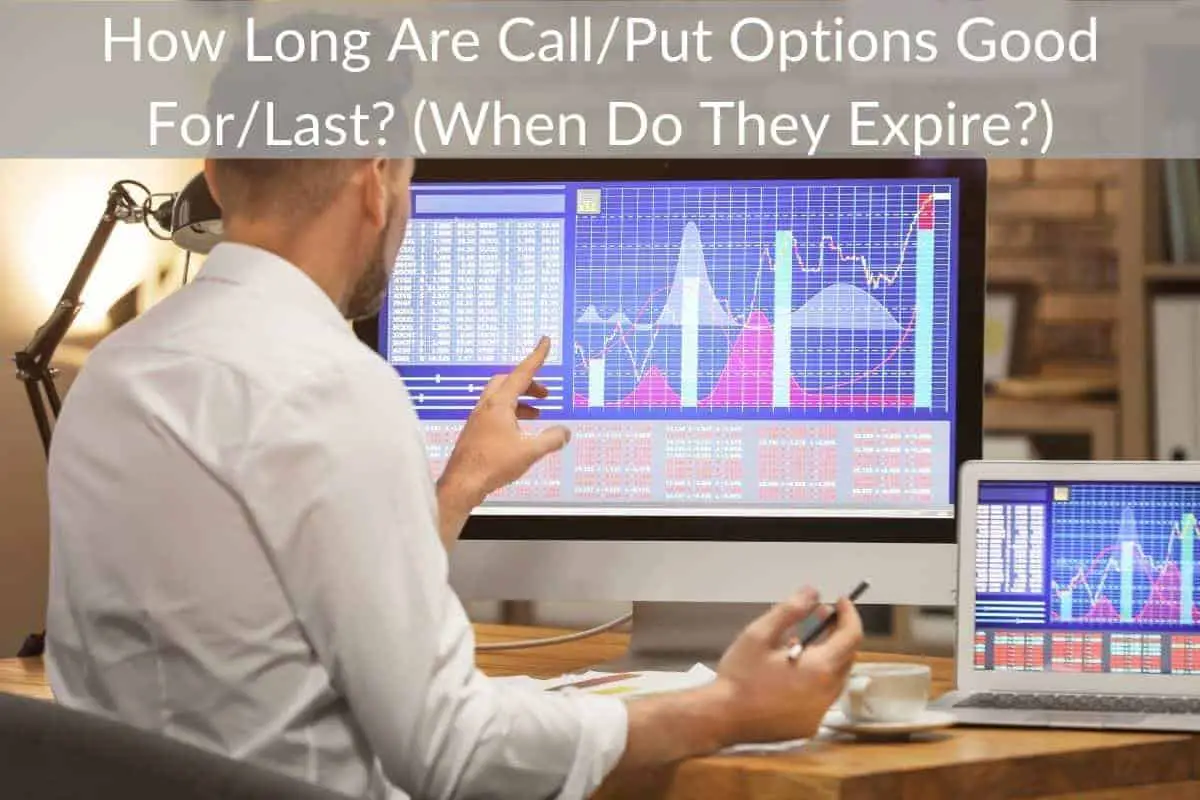Table of Contents
*This post may contain affiliate links. As an Amazon Associate we earn from qualifying purchases.
Stock options continue to explode in popularity thanks to their flexibility and profit potential. Formerly only used by wealth managers and expert traders, these contracts are now in many retail investors’ portfolios.
But unlike shares, options have a time limit.
All options are valid until their expiration date. This date varies between contracts and could last as short as a few days to as long as a few years.
At their expiration, you may let your options expire or exercise them if doing so is profitable. Calls and puts are more valuable the farther away their expiry is because more time increases the chances of profit.
This article explains how option expiration dates work. While these contracts can be lucrative, options are much more complicated to trade than shares of a stock.
If you don’t understand option expiry, you’ll likely lose much of the money you spend on them.
When Options Expire
Unlike stocks and most other securities, options have an expiration date and time.
Often, the expiration date is conveniently listed next to a contact’s name. If not, you can find it listed in the contract’s details as “Expiry Date” or something similar.
Before or on this expiration date, options owners must decide what to do with their contracts, whether that’s allowing them to expire, closing their position, or exercising them.
While the expiration dates vary between contracts, there is some consistency between them.
Specifically, monthly options contracts always expire on the third Friday of that month. If a holiday falls on that day or the stock market is closed, they expire on the preceding Thursday instead.
Additionally, options technically have an expiration time of 11:59 a.m. on the Saturday after the Friday expiration date.
But how can the expiration time occur on the day after expiration?
Options Expiration Date Vs. Expiration Time
Though it seems counterintuitive, an option’s expiration date and expiration time can mean two different things.
The expiration time is when an option technically expires, becoming invalid. The expiration date, on the other hand, is when the holder of an option must let their intentions, such as exercising a contract, be known.
Most traders only really need to keep track of the expiration date. By a specific time on that day – usually around 5:00 p.m. – investors must notify their broker if they intend to exercise.
This gives brokers and exchanges a cushion until the actual expiration time to execute the contracts as requested.
Keep in mind your time to declare on the expiration date may be earlier or later than 5:00 p.m. The exact time depends on the contract and exchange trading hours.
Furthermore, contracts may exercise automatically if they’re in the money (ITM). Or, they may be pushed out of the money (OTM) during after-hours trading and thus expire when you’re expecting them to be in profit.
How brokers and exchanges handle these sorts of situations vary. So, you should read the fine print wherever you trade to be safe.
Weekly Options Vs. Monthly Options
So far, we’ve discussed primarily how monthly options contracts work. However, investors can also trade and exercise daily and weekly options.
Though they’re almost the same, the way weekly options expire is slightly different.
Namely, weekly calls and puts expire every Friday of the month, not just the third. This is because weekly options are introduced every Thursday and expire 8 days later (the following Friday).
Weekly options are generally cheaper due to the implied volatility from their brief lifespan. This affordability has seen them become increasingly popular among investors.
Why Options Have Expiration Dates
With options becoming more popular than ever before, you may wonder why they expire at all. Why do we not have calls or puts that are exercisable at any point?
There are a few reasons, but one of the most important is their time value.
Calls and puts have much of their value extrinsically from their expiration date.
The further out that date is, the greater the chances of profit. Thus, the more valuable that option contract is.
Options with no set expiration, or expiring decades in the future, would be theoretically limitless in value. This valuation could cause all sorts of market issues if introduced to trading.
It’s also essentially impossible to guarantee coverage of an option without expiry. After all, almost no one wants to be bound to contracts with no definitive end.
Additionally, there is no way to know if the underlying assets from derivative contracts will be available in the very distant future at all.
Why Understanding Expiration Dates Is Crucial
Despite existing since ancient times, options have only very recently achieved wide-scale use and popularity. In the past, many investors considered them to be relatively complex and risky and avoided them as a result.
However, by understanding how their value relates to their expiration, you’re much better equipped to trade them.
For example, savvy investors might buy calls and put expiring near a future date where they expect massive share price movement. Those traders can then potentially capitalize on that movement or volatility via selling or exercising those options.
Knowing how expiry works can also save you from losing money. This is especially true if you didn’t previously realize that the time value of options generally decreases as the expiration date approaches.
What You Can Do Before Your Options Expire
When options expire out of the money, they provide no profit from exercising and become virtually worthless.
Owners of calls and puts want to avoid that.
So, investors essentially have two choices for their options before they expire.
First, you can try to sell your calls and puts. Options move in the market with significantly more volatility than stocks. This makes them especially popular with traders since sizable profits are attainable in brief periods.
As the value of your calls or puts swells with changes in share value, you can sell them for a profit. Conversely, you can dump contracts at a loss to avoid losing possibly more when expiry comes.
Secondly, investors may exercise their options up until they expire. Though, investors would only want to do this if those options are in the money.
Final Thoughts
Options are bigger than ever before, thanks to their newfound accessibility and public interest that is driven by social trends. Knowing how the expiration date affects an option’s value is a vital step in trading these contracts successfully.

